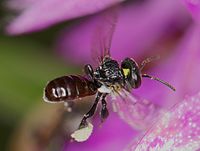
Photo from wikipedia
PREMISE Many flowering plants depend on insects for pollination and thus attract pollinators by offering rewards, mostly nectar and pollen. Bee pollinators rely on pollen as their main nutrient source.… Click to show full abstract
PREMISE Many flowering plants depend on insects for pollination and thus attract pollinators by offering rewards, mostly nectar and pollen. Bee pollinators rely on pollen as their main nutrient source. Pollen provides all essential micro- and macronutrients including substances that cannot be synthesized by bees themselves, such as sterols, which bees need for processes such as hormone production. Variations in sterol concentrations may consequently affect bee health and reproductive fitness. We therefore hypothesized that (1) these variations in pollen sterols affect longevity and reproduction in bumble bees and (2) can thus be perceived via the bees' antennae before consumption. METHODS We studied the effect of sterols on longevity and reproduction of Bombus terrestris workers in feeding experiments and investigated sterol perception using chemotactile proboscis extension response (PER) conditioning. RESULTS Workers could perceive several sterols (cholesterol, cholestenone, desmosterol, stigmasterol, β-sitosterol) via their antennae but not differentiate between them. However, when sterols were presented in pollen, and not as a single compound, the bees were unable to differentiate between pollen differing in sterol content. Additionally, different sterol concentrations in pollen neither affected pollen consumption nor brood development or worker longevity. CONCLUSIONS Since we used both natural concentrations and concentrations higher than those found in pollen, our results indicate that bumble bees may not need to pay specific attention to pollen sterol content beyond a specific threshold. Naturally encountered concentrations might fully support their sterol requirements and higher concentrations do not seem to have negative effects.
Journal Title: American journal of botany
Year Published: 2023
Link to full text (if available)
Share on Social Media: Sign Up to like & get
recommendations!